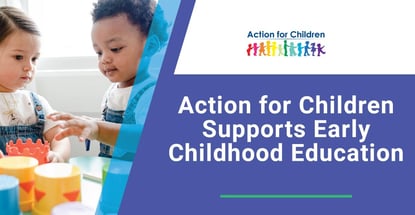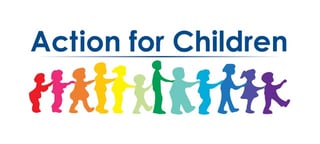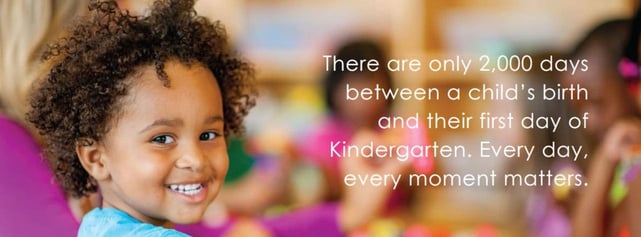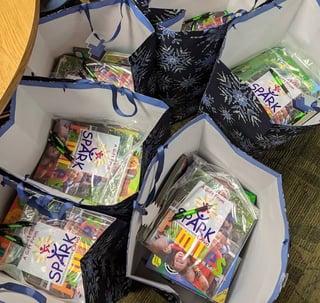
Our experts and industry insiders blog the latest news, studies and current events from inside the credit card industry. Our articles follow strict editorial guidelines.
In a Nutshell: Action for Children provides support for parents and child care providers in seven Central Ohio counties. Its services foster positive outcomes for early childhood development, forming the foundation for future learning and success. The organization pursues that mission through programs that empower the adults in a child’s life to provide children the care they need throughout their first 2,000 days of life. During the COVID-19 pandemic, Action for Children shifted to a hybrid model that includes in-person and online meetings, and generous donations drive its impact.
Action for Children was established in 1972 in Columbus, Ohio, to provide child care resources and referrals. But through the decades, its work has expanded beyond the initial scope to include working with parents, child care providers, and others who help with child development.
“Our goal is for all children to have access to fantastic early learning opportunities that set them up for success,” said Christiana Sallard, Marketing and Communications Coordinator at Action for Children.

Early childhood is a crucial time for brain development, which means it’s also an essential foundation for children’s future cognitive and emotional development. Action for Children provides parents and caregivers with the resources and the support they need to make the most of those early years and ensure they prepare children for growth and success.
Action for Children is based in Columbus, in Franklin County, and it serves six surrounding counties in Central Ohio. Its services focus primarily on the first five years of a child’s development. The organization offers services to adults who have the greatest impact on children’s lives, including parents, grandparents, foster parents, child care teachers, and other early learning professionals.
“We were founded by two women who were area natives,” Christiana said. “One was a philanthropist. The other was an early educator who worked for 60 years in child care, whether as an administrator or in a classroom. They built this from the ground up, starting from that mission and vision. We’ve kept the same mission over the last 50 years and adapted to the changing times to meet the needs of providers and parents.”
Early Education Helps Minds Develop at a Critical Stage
The first 2,000 days of a child’s life represent a crucial phase in cognitive development. From birth, children’s brain plasticity is high, and during their early lives, they quickly develop a vast number of neural pathways that facilitate learning.
As they age, these pathways naturally diminish and economize themselves. But early abundance and proliferation are critical to establishing a foundation for later learning and function.
“Healthy children are constantly learning, they’re making connections, they’re building bonds with their caregivers,” Christiana said. “We always talk about social-emotional learning and health. All of those different things are happening within those first 2,000 days, and that sets a child up for success.”

Professionals play fundamental roles in fostering that neural development and healthy growth. Child care providers who work with Action for Children are deeply committed to providing engaging, quality care to children. Action for Children provides training and licensing services that reinforce providers’ ability to facilitate learning and brain development in environments optimized for those outcomes.
Parents are an equally important component of early development. Action for Children also devotes significant resources to equip parents to provide the same care and opportunities for growth in the home.
“We also work with parents on the other side to help them understand the importance of early learning and education, and learn how to create that nurturing environment in the home as well,” Christiana said.
Programs Support Parents and Early Childhood Educators
“We’ve focused on creating a parenthood curriculum that meets participants where they are,” Christiana said. “We have several different programs that range from education to case management and support.”
One of those initiatives, FatherUp, is an umbrella program that encompasses several smaller programs across multiple counties.
FatherUp programming focuses on case management, including helping with employment and transportation, particularly in underserved and disadvantaged communities. The goal is to lower or remove barriers to success that participants traditionally face, including addressing trauma and breaking destructive cycles that can hinder a child’s growth.

SPARK’s Parent Partners work with families to prepare children to enter kindergarten. It’s conducted one-on-one with parents and children, and it helps them overcome challenges they may face in school settings.
Action for Children provides training to prepare care providers to deliver quality education and improve that quality over time. It also supports educators financially, enabling them to devote more time and attention to quality care. Action for Children operates a program to help providers achieve Child Development Associate (CDA) designations, a nationally recognized credential that helps further careers and increase income.
“All of our work with providers and parents is focused on building relationships and supporting them, helping them overcome challenges, and partnering with them throughout their entire journey,” Christiana said.
A Hybrid Model Accommodates COVID-Based Needs
Action for Children operated primarily through in-person interactions in classrooms and homes before 2020. But when the COVID-19 pandemic hit, the organization adapted its programs to protect the well-being of children, parents, and providers.
“We had to adapt to go virtual,” Christiana said. “We’re at a point now where we’re starting to consider hybrid — a little bit of in-person work alongside virtual work. But we’ve worked hard to make sure we’re still offering the same quality of service and addressing clients’ changing needs, no matter how our services are delivered.”

Action for Children implemented semi-weekly network meetings for providers with specialized licenses who remained open at the beginning of the COVID-19 pandemic.
The meetings served as an informational network and a space where providers can connect, express concerns, and share tips and resources. Following the reopening of child care, meetings continued to keep all providers informed about COVID-19 regulations, funding opportunities, advocacy opportunities, and more.
“We have a fantastic team that works with our providers and resources in the area to make sure that they’re up to date on the new COVID-19 rules and offers guidance,” Christiana said. “We send out newsletters and information just to keep them abreast. In addition, we’re constantly evaluating our classes and trainings to ensure that they’re relevant and accessible to providers.”
Sustaining and Expanding Early Childhood Education
Action for Children is preparing for future initiatives beyond its current programs. It plans to expand its services and focus on ways to provide business support for child care providers.
A recent report published by Action for Children reveals that the COVID-19 pandemic has drastically increased operating costs for providers and left parents with fewer affordable child care options. These challenges are heightened for programs and families in high-risk neighborhoods.
“Addressing some of those inequities through our work is something we’re excited about,” Christiana said.
Action for Children contracted with the city to provide child care affordability scholarships and distribute signing bonuses to boost child care provider recruitment in the first quarter of 2022. These efforts will provide crucial financial support to new providers, boost child care enrollment, and bring fresh workers into the field.
Charitable donations drive the organization’s efforts and help Ohio’s children thrive. The funding enables the organization to continue providing its programs and support.
“Every dollar given to us goes toward furthering our work, setting up children for success, and empowering educators,” Christiana said.
The organization also welcomes engagement and informal advocacy from those who want to contribute to Action for Children’s mission. Anyone can stay up to date on the organization’s activities and contribute to advocacy and activism by signing up for its newsletter.
“Sharing and engaging in our advocacy work is another way to partner with us and to be a part of the mission. We’re always looking for people to join and sign on,” Christiana said.



![7 Best Credit Cards for Single Parents ([updated_month_year]) 7 Best Credit Cards for Single Parents ([updated_month_year])](https://www.cardrates.com/images/uploads/2019/12/Best-Credit-Cards-for-Single-Parents.jpg?width=158&height=120&fit=crop)
![5 Credit Card Tips for New Parents ([updated_month_year]) 5 Credit Card Tips for New Parents ([updated_month_year])](https://www.cardrates.com/images/uploads/2020/10/shutterstock_1672923496-1.jpg?width=158&height=120&fit=crop)
![9 Best Prepaid Debit Cards For Teens & Parents ([updated_month_year]) 9 Best Prepaid Debit Cards For Teens & Parents ([updated_month_year])](https://www.cardrates.com/images/uploads/2021/06/Best-Prepaid-Debit-Cards-For-Teens-Parents.jpg?width=158&height=120&fit=crop)